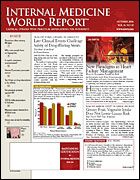Publication
Article
Internal Medicine World Report
Obese Men at Increased Risk of Infertility
Author(s):
Yet another important consequence of a high body mass index (BMI) has been uncovered?decreased fertility in men?new findings show (Epidemiology. 2006; 17: 520-523).
"This study provides data on some additional health problems associated with obesity," said David A. Schwartz, MD, director of the National Institute of Environmental Health Sciences, Research Triangle Park, NC. "Preventing obesity can help improve men's overall health, perhaps even their reproductive health."
In this trial of 1468 healthy couples enrolled in the Agricultural Health Study, infertility was far more likely to affect men with a high BMI than men who were at normal weight.
This analysis looked only at couples who had attempted to conceive in the past 4 years. Pregnancy and fertility data were obtained from questionnaires completed by the wives (all aged <40 years; most were >30 years). All the men reported their weight and height on separate questionnaires.
Infertility was defined as not conceiving after at least 12 months of unprotected sexual intercourse, regardless of whether a pregnancy occurred.
The couples were divided into 2 groups. The infertile group included those who had tried to conceive for >1 year but were unsuccessful; the fertile group included couples who had conceived within 1 year. A total of 28% of the couples experienced infertility.
BMI in the male partner was found to be an independent predictor of infertility. When additional factors that could affect fertility (ie, high BMI in the woman, age, smoking, alcohol intake, and solvent and pesticide exposure) were adjusted for, infertility generally increased in tandem with BMI, with risk nearly 2-fold greater among men who were obese.
When men were bifurcated according to age, BMI remained a significant predictor of infertility among both older and younger men. ?
No data on frequency of sexual intercourse were obtained during the study, so it is possible that the overweight men may have had less frequent sexual intercourse than their normal-weight counterparts, which itself could influence fertility, according to the investigators. However, previous studies looking at semen characteristics have shown that overweight and obese men have lower-quality semen, along with hormonal differences.
Lead investigator Markku Sallmen, PhD, who at the time the study was conducted was from the Epidemiology Branch of the National Institute of Environmental Health Sciences, and is currently at the Finnish Institute of Occupational Health, Helsinki, Finland, concluded,?"The data suggest that a 20-pound increase in men's weight may increase the chance of infertility by about 10%." ?






